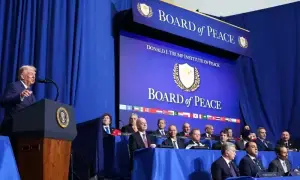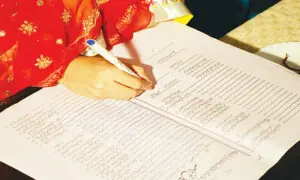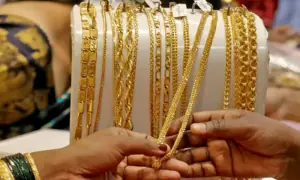Insider view: Karachi could earn Rs4.8 billion by selling offal
3 min readThe disposal of entrails from sacrificial animals is seen as an economic burden for most of the urban centers in Pakistan, with city authorities spending money on the removal of offals from the streets. This “waste’ is then buried in pits to prevent nuisance problems such as odors, flies, and scavengers.
Experts believe the city authorities may use a smarter way to recycle offals and earn around Rs4.8 billion from Karachi alone. Even a more modest estimate would suggest that the city could earn Rs1.2 billion each Eidul Azha season.
The city officials also see the potential as people in Karachi sacrifice around 4 million animals this year.
Industry insiders told Aaj News how it may work.
“In an effort to promote sustainability and reduce waste during the festive occasion of Eid-ul-Adha, the city administration should effectively utilize cattle offal rather than burying it, as it can help generate finances in the economy,” said Shaukat Mukhtar, the General Secretary of the Dairy Farmers Association Karachi, in a telephonic conversation on Wednesday.
How animal entrails may earn money
Mukhtar explained that cattle offal can be used in the following ways:
First, the liquid manure can be collected from the stomach of animals and used as fertilizer to maximize crop yields.
Second, we can obtain “Tripe” from the offal. Tripe, which is the edible stomach muscle lining, is low in calories and is considered a healthy source of protein. Mukhtar stated, “The cost of tripe is around Rs300 per kilogram (kg), while its cost will be around Rs1200 per kg if we export it to China, as they have a high demand for it.”
According to his estimates, an animal has around one kg of tripe, and with approximately four million animals being sacrificed every year, the offal could earn around Rs1.2 billion if sold in Pakistan. If exported to China, the figure would be Rs4.8 billion.
Third, the intestines of cattle are used to make hotdogs, which are popular in the USA and European countries. Mukhtar emphasized, “The USA and European countries are important markets for supplying animal intestines.”
Rising numbers
The Sindh Solid Waste Management Board (SSWMB) reported that 92,535 tonnes of offal waste were collected last year during Eid, approximately 10,000 tonnes more compared to 2021.
Tariq Nizamani, the Executive Director of Operations at SSWMB, told Aaj News, “We are expecting 110,000 tonnes of offal waste this year.”
Further, he shared the district-wise collection figures for last year. A total of 18,520 tonnes of waste was removed from District East, 13,349 tonnes from the South, 8,303 tonnes from Malir, 10,177 tonnes from the West, 11,163 tonnes from Keamari, 13,304 tonnes from Korangi, and 17,717 tonnes from District Central.
When asked about the recycling of offal, Nizamani stated, “SSWMB has plans to utilize offal as a commodity, and we will be establishing plants for recycling offal in the coming years. Currently, we have established two plants at the Garbage Transfer Stations (GTS) in Baldia and Sharafi, which recycle domestic waste into organic compost fertilizer, plastic granules, and plastic flakes.”
How to set up offal recycling plant
Regarding the ease of establishing a venture for recycling offal, Mukhtar mentioned that it can be easily set up with a flat area of around 500 square yards, hot and cold washing water facilities, and a waste disposal system for wastewater. After washing, offal can be stored for a long time by either drying or freezing it, and these services are available for rent, eliminating the need for investing in drying and freezing mechanisms.
Mukhtar further expressed, “Plants for recycling offal can be established through public-private partnerships, but due to a lack of awareness, the people of Karachi are not engaging in this financial activity.”
For the latest news, follow us on Twitter @Aaj_Urdu. We are also on Facebook, Instagram and YouTube.























Comments are closed on this story.